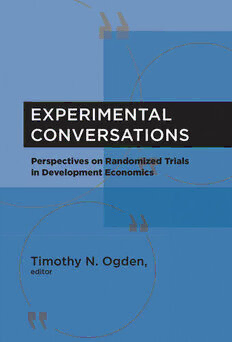Download Experimental Conversations: Perspectives on Randomized Trials in Development Economics PDF Free - Full Version
Download Experimental Conversations: Perspectives on Randomized Trials in Development Economics by Timothy N. Ogden, Michael Kremer, Abhijit Vinayak Banerjee, Esther Duflo, Angus Deaton in PDF format completely FREE. No registration required, no payment needed. Get instant access to this valuable resource on PDFdrive.to!
About Experimental Conversations: Perspectives on Randomized Trials in Development Economics
Discussions of the use and limits of randomized control trials, considering the power of theory, external validity, gaps in knowledge, and what issues matter. The practice of development economics has undergone something of a revolution as many economists have adopted new methods to answer perennial questions about the effectiveness of anti-poverty programs. In this book, prominent development economists discuss the use and impact of one of the most significant of these new methods, randomized control trials (RCTs) and field experiments. In extended interviews conducted over a period of several years, they explain their work and their thinking and consider the broader issues of how we learn about the world and how we can change it for the better. These conversations offer specialists and nonspecialists alike a unique opportunity to hear economists speak in their own words, free of the confines of a particular study or econometric esoterica. The economists describe how they apply research findings in the way they think about the world, revealing their ideas about the power of theory, external validity, gaps in knowledge, and what issues matter. Also included are interviews with RCT observers, critics, sponsors, consumers, and others. Each interview provides a brief biography of the interviewee. Thorough annotations offer background and explanations for key ideas and studies referred to in the conversations. Contributors Abhijit Banerjee, Nancy Birdsall, Chris Blattman, Alex Counts, Tyler Cowen, Angus Deaton, Frank DeGiovanni, Esther Duflo, Pascaline Dupas, Xavi Gine, Rachel Glennerster, Judy Gueron, Elie Hassenfeld, Dean Karlan, Michael Kremer, David McKenzie, Jonathan Morduch, Lant Pritchett, Jonathan Robinson, Antoinette Schoar, Dean Yang
Detailed Information
| Author: | Timothy N. Ogden, Michael Kremer, Abhijit Vinayak Banerjee, Esther Duflo, Angus Deaton |
|---|---|
| Publication Year: | 2017 |
| ISBN: | 9780262035101 |
| Language: | English |
| File Size: | 0.603 |
| Format: | |
| Price: | FREE |
Safe & Secure Download - No registration required
Why Choose PDFdrive for Your Free Experimental Conversations: Perspectives on Randomized Trials in Development Economics Download?
- 100% Free: No hidden fees or subscriptions required for one book every day.
- No Registration: Immediate access is available without creating accounts for one book every day.
- Safe and Secure: Clean downloads without malware or viruses
- Multiple Formats: PDF, MOBI, Mpub,... optimized for all devices
- Educational Resource: Supporting knowledge sharing and learning
Frequently Asked Questions
Is it really free to download Experimental Conversations: Perspectives on Randomized Trials in Development Economics PDF?
Yes, on https://PDFdrive.to you can download Experimental Conversations: Perspectives on Randomized Trials in Development Economics by Timothy N. Ogden, Michael Kremer, Abhijit Vinayak Banerjee, Esther Duflo, Angus Deaton completely free. We don't require any payment, subscription, or registration to access this PDF file. For 3 books every day.
How can I read Experimental Conversations: Perspectives on Randomized Trials in Development Economics on my mobile device?
After downloading Experimental Conversations: Perspectives on Randomized Trials in Development Economics PDF, you can open it with any PDF reader app on your phone or tablet. We recommend using Adobe Acrobat Reader, Apple Books, or Google Play Books for the best reading experience.
Is this the full version of Experimental Conversations: Perspectives on Randomized Trials in Development Economics?
Yes, this is the complete PDF version of Experimental Conversations: Perspectives on Randomized Trials in Development Economics by Timothy N. Ogden, Michael Kremer, Abhijit Vinayak Banerjee, Esther Duflo, Angus Deaton. You will be able to read the entire content as in the printed version without missing any pages.
Is it legal to download Experimental Conversations: Perspectives on Randomized Trials in Development Economics PDF for free?
https://PDFdrive.to provides links to free educational resources available online. We do not store any files on our servers. Please be aware of copyright laws in your country before downloading.
The materials shared are intended for research, educational, and personal use in accordance with fair use principles.

